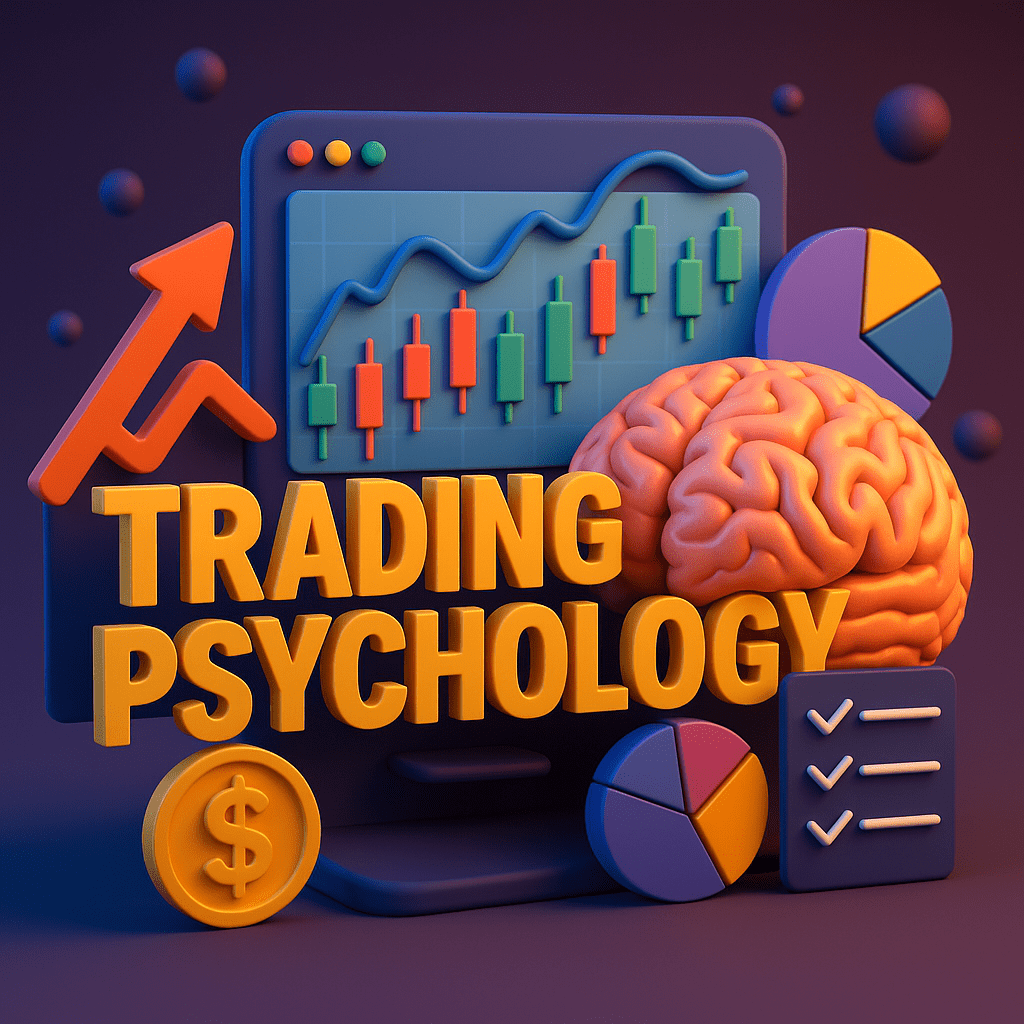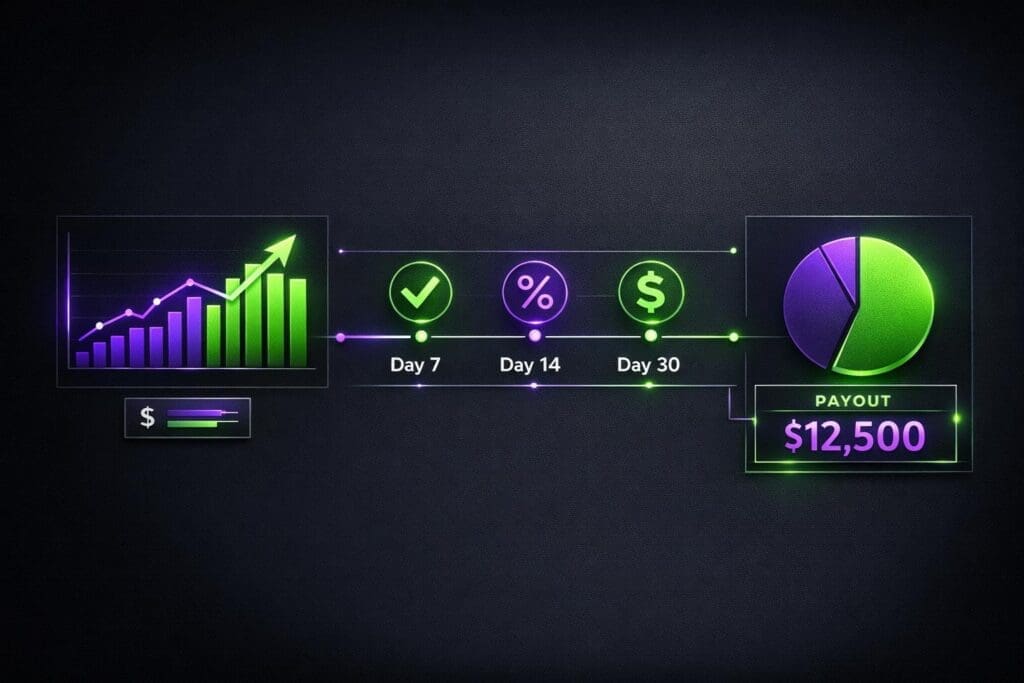Trading psychology guide: build psychological capital, avoid emotional traps like FOMO and overtrading, and treat trading like a profession, not a casino.
🧠 Trading Psychology 101: Markets Aren’t Games
Most new traders approach the market like gamblers. They chase quick wins, ride emotional highs and lows, and ignore risk rules. Studies estimate that 70–90% of traders lose money over time. Your strategy matters, but your mindset is the real edge. When emotions take over, judgment blurs, rules vanish, and risk becomes uncontrolled.
💔 Common Trading Psychology Traps
1) Casino Mentality
Treating markets like a fast-payout machine is a path to failure. Success comes from process, risk control, and discipline, not luck.
2) Emotional Overtrading & FOMO
Feeling like you must be in a trade every moment leads to chasing entries, ignoring stops, and adding to losers. FOMO replaces logic with impulse.
3) Loss Aversion & Chasing Losses
Humans feel losses more intensely than gains. That bias causes traders to hold losers too long and cut winners too early. The fix: predefined exits and rule-based risk.
4) Illusion of Control
Believing you can predict or control price action invites oversized risk and revenge trading. Focus on probabilities, not certainty.
5) Psychological Toxicity
Tired, stressed, or overconfident traders burn through psychological capital. Even a good system fails if the operator is compromised.
✔️ How To Build A Professional Trader Mindset
Turn psychology from a liability into an edge with these steps.
Step 1: Treat Trading Like A Job
Consistent profitability is a career. Study, practice, and refine a written plan. A trader who repeats mistakes without a plan is stuck in a loop.
Step 2: Protect Your Psychological Capital
- Prioritize sleep and recovery.
- Run a pre-market checklist, post-market review, and weekly reset.
- If emotions spike, stop trading. One bad session can erase weeks of progress.
Step 3: Install Risk Rules That Enforce Discipline
- Set a max daily loss. If hit, you are done for the day.
- Cap the number of trades per session.
- Predefine setup, entry, invalidation, and exit before clicking buy.
- If you feel angry, euphoric, or rushed, step away and reset.
Step 4: Control Wins And Losses
- After a big win, keep size constant. Do not upsize recklessly.
- After a loss, avoid revenge trades. Review, identify the error, wait for your setup.
- Aim for emotional neutrality. No one should know if you just won or lost $2,000.
Step 5: Adapt As Markets Change
What works in one regime may fail in another. Stay curious, humble, and flexible. Rules plus discipline beat prediction.
🔍 Fast Facts That Prove Mindset Matters
- Only a small minority of day traders are profitable long term.
- Most traders lose because emotions override rules and risk limits.
- Stress and physiology influence risk-taking more than experience when rules are absent.
🚀 Apply This Today
- Daily reflection: log one emotion that affected a trade and how you will counter it next time.
- Trade only A-setups: write setup, entry, invalidation, and stop first.
- Daily guardrail: set a max loss or max trades and honor it.
- Weekly review: which rule protected you, which emotion hurt you, what changes next week.
- Journal everything: track state of mind, sleep quality, stress, and decisions alongside P&L.
🧭 Final Word
Your trading psychology is your main competitive advantage. Charts and indicators are tools. Your mind is the operator. Protect psychological capital, obey rules, and act like a professional. Trading is not about luck. It is about consistent execution.
🏦 How Prop Firms Can Improve Your Trading Psychology
One of the most effective ways to strengthen your trading discipline and emotional control is by trading through a futures prop firm. Prop firms like Lucid Trading, Tradeify, and The Futures Desk are designed to enforce structure and accountability, two essential traits for mastering trading psychology and consistency.
Most prop firm rules are built to protect both the trader and the account. Features such as Daily Loss Limits, Maximum Drawdowns, and Consistency Rules create a structured framework that helps traders manage risk, avoid impulsive decisions, and trade more intentionally. For example, a Daily Loss Limit prevents emotional revenge trading by automatically stopping you after a set loss threshold, reinforcing discipline and preventing burnout.
These built-in restrictions help traders form healthy habits controlling drawdowns, respecting stop levels, and focusing on high-probability setups. Over time, that structure builds emotional resilience, consistency, and long-term profitability, the foundation of true psychological capital.
Because prop firms use simulated capital, they also remove personal financial pressure. This allows traders to focus on process over outcome, a key factor in developing a calm and professional mindset. Whether you trade gold futures, indices, or micros, prop firms provide the perfect environment to refine your risk management and discipline.
If you’re serious about improving your trading psychology, using a futures prop firm evaluation account is one of the smartest ways to accelerate your growth while building lasting discipline.
Trading Psychology FAQ
How do I manage fear and anxiety while trading?
How can I develop and maintain discipline in trading?
What are the best ways to handle losses and setbacks?
How do I avoid being influenced by emotions like greed and overconfidence?
What role does self-awareness play in successful trading?
How can I improve focus and mental clarity while trading?
Why do most traders fail psychologically?
Can prop firm rules help with trading psychology?
How do I overcome FOMO (Fear of Missing Out)?
What habits strengthen trading mindset over time?
Recommended Reads to Strengthen Your Trading Psychology
-
How End-of-Day Drawdown Works in Futures Prop Firms
Understand trailing vs fixed logic so you stop overreacting intraday and keep your psychological capital intact.
-
Tradeify Consistency Rule — Full Guide for Funded Traders
Turn “consistency rules” into a performance habit instead of a constraint.
-
Unrealized Trailing Drawdown Explained
Why unrealized tracking can trigger emotional tilts and how to avoid them.
-
Trading Psychology Hub
Mindset frameworks, journal prompts, and tactical resets for tough sessions.
-
Best Futures Prop Firms Guide
Compare rules like Daily Loss Limits and payout cadence to match your temperament.
-
Free Consistency Rule Calculator
Check if your results meet prop firm rules before you request payout.


